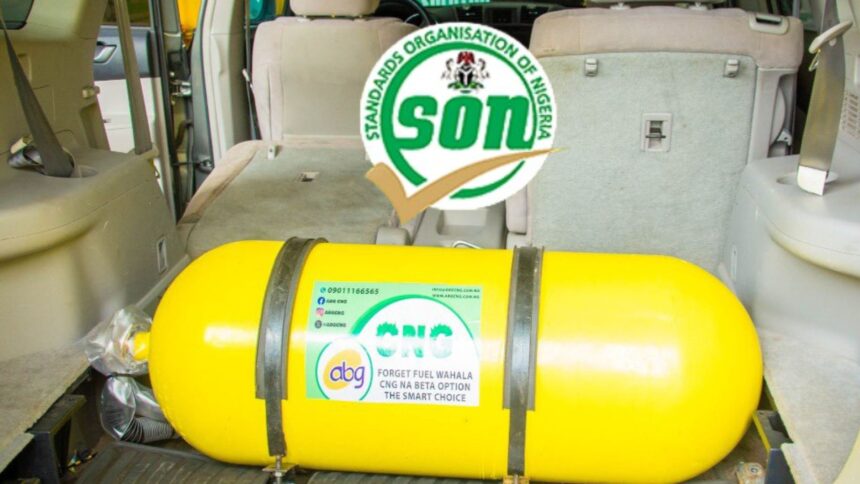… directs filling station attendants to check ‘Pressure Certificate Label/Plate’ before refueling CNG cylinder
…vows to penalize manufacturers, investigate consumer complaints, enforce certification of conversion centres
Oredola Adeola
The Standards Organisation of Nigeria (SON) has introduced 87 new standards and one Nigerian National Guideline (NNG) to regulate and certify all Compressed Natural Gas (CNG) products in Nigeria.
Advisors Reports gathered that the approval process for the standards and guideline was coordinated by the National Technical Committee in alignment with SON’s statutory mandate to ensure compliance with established standards.
Engr. Olalekan Omoniyi, Deputy Director of the Standards Development Coordination Division (SDCD) in SON’s Standards Development Department, disclosed this during a webinar hosted by the Competency Centre of the Major Energy Marketers Association of Nigeria (MEMAN) on Wednesday.
The event was themed “Driving the Energy Transition: CNG Conversion.”
Omoniyi explained that the introduction of the standards and the guideline—NNG 1214:2024—aims to streamline the installation of CNG conversion kits and components for vehicle propulsion systems.
He emphasized that the initiative was supported by the Presidential Compressed Natural Gas Initiative (PCNGi), relevant regulatory agencies, and the National Technical Committee on Road Vehicles, whose representatives were involved in the approval process.
“The development and approval of the standards were expedited through four technical committee meetings, completed within five months.
“The final step came with the assent of Dr. Doris Uzoka-Anite, former Minister of Industry, Trade, and Investment, authorizing the standards to take effect,” he mentioned.
Omoniyi hinted that the standards were developed following the Principles and Procedure for the Development of Nigerian National Standards (PPDNNS) and are aligned with global best practices.
The National Technical Committee included experts from various sectors, including industry and commerce, government, academia, consumers, NGOs, and SMEs.
“The developed standards address both product and administrative requirements necessary for the CNG conversion process,” Omoniyi noted.
He stated that key product requirements under SON’s statutory responsibility include: CNG as a product, Storage equipment (vessels), Conversion kits (components, electrical devices, and measuring instruments) and Certification of equipment and kits.
Administrative requirements managed by partner agencies cover: Roadworthiness of converted vehicles; Safety reviews of completed conversions; Certification of conversion personnel and centers, as well as Electrical wiring of vehicles.
Omoniyi further revealed that SON signed a Memorandum of Understanding (MoU) with PCNGi and key stakeholders for Conformity Assessment and Certification of CNG equipment towards ensuring that all CNG products in Nigeria meet the required standards for safety, quality, and efficiency.
Engr. Omoniyi, disclosed these measures while providing updates on SON’s efforts to promote safety and compliance in Nigeria’s growing CNG sector.
He explained that SON has taken proactive steps to raise public awareness about the required standards for CNG conversions and trained over 100 of its staff on CNG processes and standards. This training was done in partnership with Mijo and Fixit 45 Ltd.
Additionally, SON has trained laboratory analysts on testing CNG kits and cylinders and has upgraded its conformity assessment programs to enhance monitoring capabilities.
Omoniyi highlighted two recent incidents involving CNG-powered vehicles, emphasizing the critical need for adherence to established standards.
The first incident occurred in Abeokuta, Ogun State, involving a Sinotruck dump truck with a factory-installed CNG system.
The accident could have been avoided if the truck owner had followed standard requirements, particularly Clause 4.7.1(1) of NIS ISO 15500-1:2025, which specifies guidelines for designing reserve cylinder enclosures.
According to Omoniyi, the truck’s pressure relief device, known as a burst disc, failed to deploy as mandated by NIS ISO 11439, which could have stopped the flow of CNG to the fire.
In a second incident, he explained that an uncertified CNG cylinder installed on an Audi 80 saloon car exploded at a NIPCO refueling station along the Benin-Auchi Expressway in Edo State.
Omoniyi attributed the explosion to non-compliance with NNG 1214:2024, the guideline for installing CNG components in vehicle propulsion systems.
He noted that a quick inspection of the cylinder’s “Pressure Certificate Label/Plate” could have alerted the attendant to potential safety risks, preventing the accident.
Omoniyi stressed that such labels not only provide vital information for refueling attendants but also assist investigators in identifying the installation center in case of an incident.
To avoid future incidents, Omoniyi encouraged refueling stations to conduct visual inspections of cylinders, focusing on the “Pressure Certificate Label/Plate” before proceeding with refueling.
Omoniyi stated, “SON and partner agencies must enforce the use of Pressure Certificate Plates to ensure safety.
“Conversion centers and personnel should undergo proper certification before receiving operational approval, in accordance with NNG 1214:2024 guidelines,” he said.
Omoniyi further emphasized that SON’s training services are available to stakeholders interested in understanding CNG standards and compliance procedures, underscoring the agency’s commitment to a safer CNG conversion industry in Nigeria.




